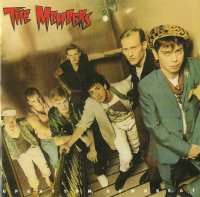Uprhythm, Downbeat
Uprhythm, Downbeat is the third album from punk rock band The Members. It includes one of the band's most successful singles in the U.S., "Working Girl", and the single "Radio", which was a major chart hit in Australia.[2] Although it was released in 1982 in the United States, the record was unavailable in the band's native Britain until 1983, when it was released as Going West by Albion Records.
| Uprhythm, Downbeat | ||||
|---|---|---|---|---|
 | ||||
| Studio album by The Members | ||||
| Released | 1982 | |||
| Genre | Punk rock | |||
| Label | Arista | |||
| Producer | Martin Rushent, The Members, Dave Allen | |||
| The Members chronology | ||||
| ||||
| Review scores | |
|---|---|
| Source | Rating |
| Allmusic | |
Track listing
Note: Following is the track listing for the 2006 remastered version of the album. The original album's version of the track "Radio" (titled "Radiodub" on the original) is actually over two minutes longer than the one on this remastered version.
- "Working Girl" (Tesco, Carroll)
- "The Family" (Carroll)
- "The Model" (Ralf Hütter, Karl Bartos, Emil Schult)
- "Chairman of the Board" (Tesco, Payne, Carroll)
- "Boys Like Us" (Tesco, Lillywhite, Payne, Carroll, Thompson)
- "Going West" (Payne)
- "Radio"
- "Fire (in my Heart)" (Tesco, Lillywhite, Payne, Carroll, Thompson)
- "You and Me Against the World" (Tesco, Lillywhite, Payne, Carroll, Thompson)
- "We the People" (Tesco, Payne)
2006 CD Bonus Track
- "Working Girl" (single version)
- "Holiday in Tanganika"
- "Every Day is Just a Holiday"
- "If You Can't Stand Up"
- "At the Arcade"
- "Membership"
Personnel
- The Members
- Nicky Tesco - vocals
- Jean-Marie Carroll - guitar, keyboards, background vocals
- Nigel Bennett - guitar, keyboards, background vocals
- Chris Payne - bass, background vocals
- Adrian Lillywhite - drums, percussion
- Steve "Rudi" Thompson - saxophone
- Simon Lloyd - keyboards, Fairlight programming, trumpet, saxophone
with:
- Dave Allen - Roland programming
- Martin Rushent - Fairlight programming
gollark: Now I need to answer a question!
gollark: And top 1% for crime.
gollark: * 0.8%
gollark: It's actually top 0.8 in the world for rudeness!
gollark: You'll note the lack of stuff like "courts" and "law and order".
This article is issued from Wikipedia. The text is licensed under Creative Commons - Attribution - Sharealike. Additional terms may apply for the media files.